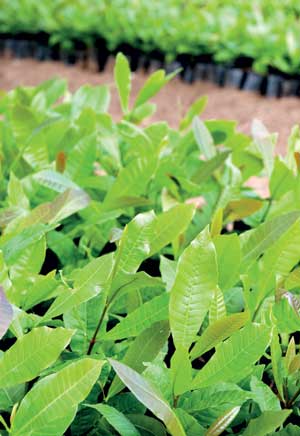Wednesday Feb 18, 2026
Wednesday Feb 18, 2026
Thursday, 23 March 2017 00:00 - - {{hitsCtrl.values.hits}}
Dilmah has successfully fulfilled the pledge made in 2014 by Dilmah Founder Merrill J. Fernando, to become a carbon neutrality facility by 2017, further strengthening their commitment to reduce their impact on the environment. Through initiatives such as ‘Greening Batticaloa’ and ‘Biochar Application’, Dilmah was able to actively reduce their carbon footprint to zero, thus marking a momentous net zero release of carbon into the atmosphere.
Dilmah’s journey towards becoming a carbon neutral facility began in 2011 following the completion of their first sustainability report carried out by the International Union for the Conservation of Nature (IUCN). This eventually led to a comprehensive analysis of Dilmah’s carbon footprint being carried out by Dilmah Conservation together with the University of Colombo in 2013, resulting in the development of a Carbon Neutrality Action Plan which focused on four main areas; Energy, Transportation, Water and Waste.
In addition, the plan included further recommendations that Dilmah could take such as conducting internal training and awareness programs, improving energy and resource efficiency through the implementation of innovative schemes, adding to renewable energy sources and implementing other alternatives reducing emissions. It was following this in 2014 when Founder Merrill Fernando proudly announced Dilmah’s pledge to become a Carbon Neutral facility by 2017, paving the way for Dilmah to take the necessary steps required for their operations to reach net zero carbon emissions and thereby reduce their environmental impact and interlinked climatic consequences. 
Initiatives such as ‘Greening Batticaloa’ – a program set up in the Eastern Province of Sri Lanka through which 500,000 cashew plants have been planted to date, ‘Biochar Application’ – a research program looking into the potential of biochar as an environmentally-friendly soil enhancer in tea cultivation, and the installation of two solar power plants (100KW and 150KW) at Dilmah Headquarters – one of the largest privately-held solar power generations in Sri Lanka, are a few of Dilmah’s ambitious endeavours, focused on habitat restoration in the North and East of Sri Lanka, reducing the usage of harmful chemical fertilisers in Sri Lanka’s tea estates and promoting the use of renewable energy, respectively, to achieve carbon neutrality. Additionally, in early 2016 Dilmah’s global partners, 107 to be exact, joined in solidarity with Dilmah and committed to working towards achieving carbon neutrality.
Further to these, Dilmah Conservation – which played an instrumental role in Dilmah’s Carbon Neutral journey – has a number of new sustainable initiatives lined up for this year such as the ‘Waste for Life’ – 20% of the waste accumulated at Dilmah Headquarters will be recycled to produce low cost building material, ‘Solar to Staff’ – the staff at Dilmah Headquarters will be provided solar power through the installation of solar panels at their private residences through which Dilmah can collect carbon credits, ‘Renewable Energy Sources’ – establishment of hydropower stations and wind turbines in generating alternative renewable energy as well as switching to environmentally-friendly electric cars in cutting down carbon emissions from transport. These initiatives intend to further strengthen the efforts of Dilmah in actively reducing their carbon footprint and help maintain their journey as a Carbon Neutral facility in the years to come.
Together, all these steps propelled Dilmah to successfully and proudly reach their goal of becoming a Carbon Neutral facility and to receive the Carbon Neutral Certification from the Sri Lanka Climate Fund (SLCF) in accordance with the global greenhouse gas emissions measuring standards, thus Dilmah Tea is now packed fresh in their Carbon Neutral facility. This milestone echoes Dilmah Conservation’s core commitment to environmental sustainability and Dilmah’s commitment to ensuring that all of their operations will be bound by a respectful and sustainable interaction with the environment.